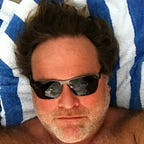Book People
Apparently, E.L. Doctorow once taught a course at NYU that only had one book on the syllabus. The class read the book and decided from there what the next book should be. If it was Jane Eyre, say, somebody might suggest The Wide Sargasso Sea, the prequel and written by another writer at a completely different time. Perhaps, reading both books would give a person a rounder sense of the world created by two different sets of characters.
Or, one could, if they were in architecture class, read something about Gaudi that would lead her to book that came to life in Barcelona: Colm Toibin’s Homage to Barcelona, for example.
I have no idea if Doctorow’s class was a literature course or a writing workshop, or if this story is even true — but it doesn’t matter. What’s so right about the teaching strategy is that a lot of us read like this anyway. We read in the order that we live, or more precisely, in the order of our interest or curiosity. Why can’t every class read as this one does? For one thing, it keeps the course surprising, which, like in writing, could be the one great reason to continue attending school in the first place.
When poets Jean Valentine and Adrienne Rich were at Radcliffe, the Dean of the school suggested that they both take General Studies. Because they were both there to write poetry, they quickly found out that you couldn’t take poetry at Radcliffe. For credit, anyway. But in a way, they lucked out. In General Studies, they had to read everything. Jean once remarked that, in part, it made her a better poet than if she only read poetry. And Randall Jarrell said, read at whim.
When my friend Beth (an extraordinary pianist), and I both applied to Bennington College, I asked her why she wanted to go. The school was famously hard to get into and neither of us had done very well in a complicated tempest known as high school. Beth said, very matter-of-factly, “I want to go because I want to talk about Bach with an architecture major.” Like an annoying little genius. But think about it, too. Architecture, of course, could certainly be considered back road to Bach. Beth didn’t want to talk about how the music made her feel, but how it was built. She wanted a second opinion before she settled on the concluding finding.
Most writers I know are incredibly curious about how life is built — and it all breaks off into so many kinds of subject matter that I always have to be reading at least two or three books at once: a book or two of poetry and a book of non-fiction. And, if I’m feeling really adventurous, a novel. Because a novel, to me, is the hardest thing to read. There’s usually a structure to a novel, and I like structure broken down a bit more than most fiction (wild, included) usually delivers. I want to more than occasionally liken reading to dreaming, the way John Gardner talked about writing fiction and reading like a writer, in other words.
And because I am going back and forth with books, they all eventually read into each other. Am I in a zone like Alpha, but not quite Alpha? Taken as a whole, the book crowding starts to sound dissonant. I like dissonance, in music and art.
I am more of a cataloging listener than I am a reader, though. I will generally listen to all the music by one person and then go on to the next singer or composer. But I don’t do that so much with books. I haven’t read — I don’t think — all the books by any living writer (principle before personality?) except for all of the books by some poets because the books are usually shorter. Oh, but there is one writer I’ve read a lot of, I forgot. William Maxwell.
All of which to say, I don’t know what I’m going to read next. I may spend the rest of the year reading everything else by Adrienne Rich because there won’t be a new Adrienne Rich book anymore. Or it may be a book off any number of stacks that surround me and have always surrounded me — stacks arranged too, in the order that I am curious, with the stipulation that I am living. The newest books are usually on top. But that doesn’t mean anything, either. Even if I never get to all of them, those books piled high stand as a monument to the only empire that will never fall — the imagination.
